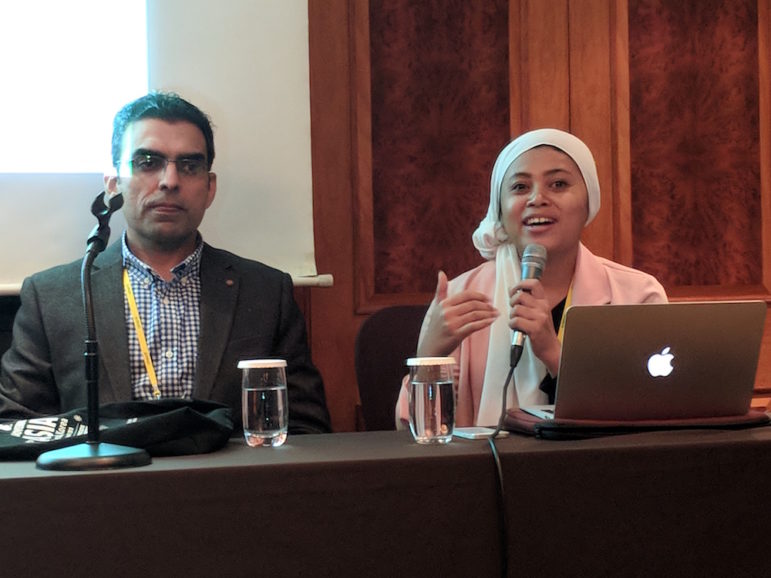“I did a good job! It was worth it! Those words helped me to stay strong during torture,” said Umar Cheema, a Pakistani journalist who was captured and tortured while working on a story that would have discredited the government. “They didn’t want me to talk about what they did. But that was the first thing I did afterwards. Otherwise, they would have threatened me over a lifetime.”

Harassed and Detained: Pakistani journalist Umar Cheema and Indonesian journalist talk about dealing with threats — both on and offline. Photo: Maike Hansen
Trading in delicate information has always been a dangerous currency, and the people delivering it risk their physical and mental safety. During an Uncovering Asia panel about on and offline harassment, journalists from the region shared their stories about dealing with threats in their day-to-day work.
Indonesian freelance journalist Febriana Firdaus pointed out that many reporters working in crisis regions are freelancers like herself. They are often left to take their own risks.
“Even if your editor says he will help you out, don’t have any expectations,” says Firdaus. Firdaus reports mainly on human rights issues and, after writing about Indonesia’s mass killings of 1965, she was expelled from an official meeting with former military offices, with threats against her going viral in 2016 and 2017. “Right now, I have my own security protocol,” she said. “It gives me strength.”
Aung Naing Soe, who was working in different ethnic areas in Myanmar, was jailed for his work. After operating a drone in Naypyidaw, near Myanmar’s government buildings, Naing Soe and his team were arrested and detained for two months. “Luckily, there was no sensitive data on my computer or my cellphone,” he said. But his story is an example of how officials can arrest journalists under false pretenses. “I don’t really believe that I was arrested for operating with a drone.”
Reg Chua, chief operating officer for Reuters News, is well aware of the serious dangers the journalists working for him face. Reporters Wa Lone and Kyaw Soe Oo were tried on Official Secrets charges and sentenced to seven years imprisonment in Myanmar for their work investigating the killings of 10 Rohingya men and boys by the military and their accomplices in Rakhine state. Reuters has been extremely vocal in lobbying the government of Myanmar and its civilian leader Aung San Suu Kyi to immediately and unconditionally release the journalists. Chua said his organization takes threats — online and off — seriously.
“In some very dangerous cases, neither the editor nor the journalist decides whether a story finally gets researched from a certain point on,” said Chua. “We take it to a higher level, so the responsibility lies somewhere else.”
The panelists offered some basic protection measures against threats and harassment:
- Tell the story that needs to be told.
- Do not draw attention to yourself.
- Where are you vulnerable? In social circles? Secrets which could serve as blackmail?
- Make sure you have only have one enemy at a time; don’t work with your back against a wall.
- Calculate the risk and be strategic. Only publish something if the consequences are worth it.
- Check your online security, including safe messaging systems, VPN and email.
 Maike Hansen is a researcher at the University of Saarland in Germany in the comparative literature department. She is a fellow with Konrad Adenauer Foundation journalism academy.
Maike Hansen is a researcher at the University of Saarland in Germany in the comparative literature department. She is a fellow with Konrad Adenauer Foundation journalism academy.
